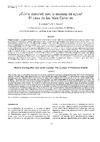Identificador persistente para citar o vincular este elemento:
https://accedacris.ulpgc.es/jspui/handle/10553/3014
| Campo DC | Valor | idioma |
|---|---|---|
| dc.contributor.author | Custodio, Emilio | en_US |
| dc.contributor.author | Cabrera, M.C. | en_US |
| dc.date.accessioned | 2010-02-11T02:31:00Z | - |
| dc.date.accessioned | 2018-03-02T09:36:31Z | - |
| dc.date.available | 2018-03-02T09:36:31Z | - |
| dc.date.issued | 2002 | en_US |
| dc.identifier.issn | 0366-0176 | en_US |
| dc.identifier.uri | https://accedacris.ulpgc.es/handle/10553/3014 | - |
| dc.description.abstract | Escasez de agua no necesariamente significa pobreza, como se dedcice de un análisis de áreas geográficas. Hay países relativamente ricos\ncon escasos recursos hidricos y paises pobres con abundancia de agua dulce. La sociedad humana desarrollada dispone de recursos científicos,\ntecnicos, económicos, institucionales \\; politicos para aáecuar la disponibilidad de agua a la demanda y viceversa, de un modo tendente\na la sustentabilidad, siempre y cuando las actividades econornicas se modifiquen convenientemente y esa sustentabilidad sea un\nobjetivo social deseado y participadc. El Archioiélago de Canarias esta en la región érida sahariana, aunque con ireas de pluviosidad relativamente\nelevada en sus vecientes septentrionales afectadas por la circulación de los vientos alisios y masas atlánticas de aire húmedo.\nLa escasez de agua es algo bien asumido e internalizado en muchas de las áreas insulares canarias, en especial :ras la explosión demográfica\ndel siglo XX. No por ello deja de ser una región europea ae economía aceptable y notablemente rica relativa al entorno geográfico\npróximo. La consecución de agua dulce es el resultado acumulado de un gran esfuerzo económico e imaginativo secular, con matices\ndiferentes en cada isla y en cada parte de una misma isla. Sin embargo subsisten o han aparecido graves disfunciones a causa de la rapida\nevolución, arraigo de actividades agricolas no sustentables, debilidad insritucional y escasa participación ciudadana en la ~oliticad el\nagua a largo plazo, en un ambiente científico y técnico aiin por consolidar. No obstante. los logros en captaciór, de aguas subterraneas\nsor. espectaculares y el avance en desalinización y reutilización son m ~nyoto rios. ABSTRACT: relatively rich with scarce water resources and poor countries that have plenty of freshwater. A developed human society has scientific,\ntechnical, economic, institutional and policy resources to adapt water availability to demand, and vice versa, in a way that tends to sustainabílity.\nThis needs modifying conveniently economic activities and making sustainability a wanted and participated social goal. The\nArchipelago of the Canaries is placed in the Sanaran dry belt, although there are some areas of relatively high rainfall in the north-facing\nslopes of the isiands, which intersect the circulation of trade winds and atlantic humid air masses. Water scarciTy is something well assumed\nand internalised in many of the areas of the Canaries, especially afier the demographic explosion of the XX century. But this does\nnot imply poverty; actually it is an Eu8-opeanr egion wlth acceptable economic leve1 and notably rich respect the nearby geographical area.\nFreshwater wining is tne accumulated result of secular economic and imaginative efforts, which present differences from island to island\nand even incide the same island. Nowever some serious malfuncrions remain oí have appeared o'ue 10 the fast evolution, persistence of\nunsustainable agricultura1 activities 2nd still scarce public participation ir) long-term water policies. This happens in a scientific and iechnical\nenvironment which is stil! to be consolidated. However there are spectacular achievements in groundw~ter wining, and there are\nnotorious progress in desalination and water reuse. | en_US |
| dc.language | spa | en_US |
| dc.relation.ispartof | Boletín Geológico y Minero | en_US |
| dc.source | Boletín Geológico y Minero [ISSN 0366-0176], v. 113(3), p. 243-258 | en_US |
| dc.subject | 250605 Hidrogeología | en_US |
| dc.subject.other | Agua subterránea | en_US |
| dc.subject.other | Escasez de agua | en_US |
| dc.subject.other | Gestión del agua | en_US |
| dc.subject.other | Recursos de agua | en_US |
| dc.subject.other | lslas Canarias | en_US |
| dc.subject.other | Canary Islands | en_US |
| dc.subject.other | Ground water | en_US |
| dc.subject.other | Water management | en_US |
| dc.subject.other | Water ressources | en_US |
| dc.subject.other | Water scarcity | en_US |
| dc.title | ¿Cómo convivir con la escasez de agua? El caso de las Islas Canarias | en_US |
| dc.title.alternative | How to live together with water scarcity? The example of the Canary lslands | en_US |
| dc.type | info:eu-repo/semantics/article | en_US |
| dc.type | Article | en_US |
| dc.identifier.absysnet | 290173 | - |
| dc.identifier.crisid | -;2328 | - |
| dc.description.lastpage | 258 | en_US |
| dc.description.firstpage | 243 | en_US |
| dc.relation.volume | 113 | en_US |
| dc.investigacion | Ciencias | en_US |
| dc.type2 | Artículo | en_US |
| dc.identifier.external | -;2328 | - |
| dc.description.numberofpages | 16 | en_US |
| dc.utils.revision | Sí | en_US |
| dc.identifier.supplement | -;2328 | - |
| dc.identifier.supplement | -;2328 | - |
| dc.identifier.ulpgc | Sí | en_US |
| dc.contributor.buulpgc | BU-BAS | en_US |
| dc.description.esci | ESCI | |
| item.fulltext | Con texto completo | - |
| item.grantfulltext | open | - |
| crisitem.author.dept | GIR IUNAT: Geología de Terrenos Volcánicos | - |
| crisitem.author.dept | IU de Estudios Ambientales y Recursos Naturales | - |
| crisitem.author.dept | Departamento de Física | - |
| crisitem.author.orcid | 0000-0002-4556-4665 | - |
| crisitem.author.parentorg | IU de Estudios Ambientales y Recursos Naturales | - |
| crisitem.author.fullName | Cabrera Santana, María Del Carmen | - |
| Colección: | Artículos | |
Visitas 1
1.751
actualizado el 10-ene-2026
Descargas
1.151
actualizado el 10-ene-2026
Google ScholarTM
Verifica
Comparte
Exporta metadatos
Este elemento está sujeto a una licencia Licencia Creative Commons

